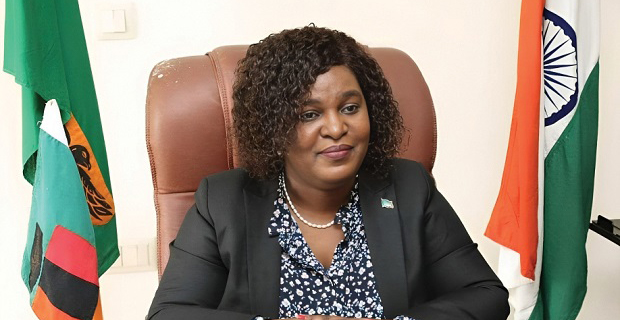“INDIA IS A RELIABLE PARTNER AND FRIEND”
India and Zambia have long-established diplomatic, business and cultural ties. Since India attained independence from Britain, Zambia turned to us for both political and economic support during its own struggle for independence from the empire. Today bilateral ties are flourishing. Acting High Commissioner Mrs Deliwe N Mumbi responded to questions from Diplomatic and Business Editor Yogesh Sood.
What are the main sectors that Indian businesses can look at when it comes to investing in Zambia?
Zambia is diversifying its economy from copper to agriculture. This is because Zambia has plenty of arable land with fertile soils and abundant fresh water bodies suitable for agricultural activities.
There are many investment opportunities in the agriculture sector in Zambia across the value chain and it is for this reason that the Zambian Government has introduced the farm block development programme (FBDP) to facilitate agricultural land and rural development and encourage private sector investment.
The Government is also promoting value addition to all agricultural produce to create more jobs for locals and add to export earnings. This has opened opportunities for investors intending to go into farming as well as manufacturing through agro processing. Other sectors include tourism, infrastructure, mining, and manufacturing.
Who are the major Indian players in the Zambian economy at present, and do you see the contribution of Indian businesses in your economy going up in the future?
Zambia is currently enjoying close to US$ 5 billion worth of Indian investments with 554 companies currently prospecting in Zambia on a long term basis. The Indian population in Zambia is around 30,000 and this goes to show the ease of doing business in Zambia.
The major companies that invested in Zambia include Indo-Zambia Bank, Vedanta Limited, Bharti Airtel (Trading as Airtel Zambia), TATA Group including hotel Taj Pamodzi, Tata Motors Ltd, Neelkanth Group of Companies, PLR Projects and Parrogate, Trade Kings, DS Group, among many others.
What is the role of the Indian Diaspora in Zambia, and has it been able to further strengthen bilateral ties?
Zambia is also home to close to 30,000 Indians, some of which have since changed citizenship. They are well integrated into Zambian society and have been embraced as family.
These have also contributed to the economic development of Zambia as they run a chain of businesses which are not only providing employment to the locals but are also paying taxes to the Government. They are expanding their businesses because they have taken advantage of the attractive and conducive investment climate since Zambia is open for business, trade and investment and the Government protects and supports foreign investments to ensure that investors get a return on their investment.
How would you view the role played by Indian and Zambian chambers of commerce, and tourism companies, in enhancing business ties between the two nations?
Both chambers are critical for exploring various frontiers of collaboration between India and Zambia creating the possibility of sharing India’s expertise in various fields with Zambia and collaborating on joint projects to promote trade and investment for the two countries.
These are a platform for the exchange of knowledge and best practices between India and Zambia. Such engagements highlight the potential for greater collaboration between India and Zambia in the fields of mutual interests.
How critical is the role of the media in promoting relations between the two countries?
The media has always played a critical role in information dissemination. Understanding differences in beliefs and backgrounds helps people from different societies to relate and negotiate well and this is where the media comes in handy to try and bridge the gap.
In the absence of a clear understanding of each other, intercultural relations have continued to fail because many people are not aware of their cultural identity and that of other people and therefore, may not appreciate anything to do with culture.
The media greatly facilitated the movement of information and ideas across national and cultural boundaries, contributing to a feeling of interconnectedness and understanding on a global scale.
Please shed some light on the cultural exchanges between the two countries?
Zambia is one of the countries that have continued to benefit from the Indian Council for Cultural Relations (ICCR)whose mandate is to administer scholarship programmes the Government of India annually awards thousands of scholarships under 20 different schemes to foreign students from about 180 counties.
Its objectives are to actively participate in the formulation and implementation of policies and programmes pertaining to India’s external cultural relations; to foster and strengthen cultural relations and mutual understanding between India and other countries; to promote cultural exchanges with other countries and it is from these training opportunities and exchange programmes that the two countries have come to appreciate each other’s culture.
Because of this close interaction in the area of training and art, it is not surprising that there is such a huge number of Indians in Zambia that have either settled there for business or have changed their nationality and this could not have been possible without close collaboration between nationals from the two countries.











Comments.